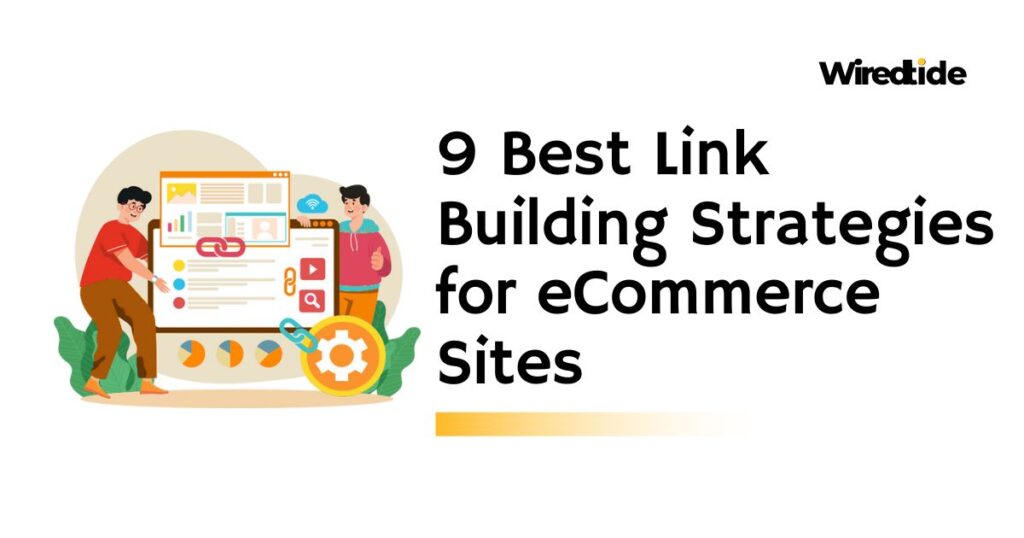If you run an ecommerce website, you already know how hard it is to stand out online. There are thousands of online stores, all trying to attract customers and rank higher in search engines like Google. One of the most effective ways to improve your search engine rankings is through link building.
Link building means getting other websites to link back to your site. These links are called backlinks. Search engines see backlinks as a sign that your site is trustworthy and useful. The more high-quality links you have, the more likely your store is to appear on the first page of search results.
In 2025, link building strategy is still very important, but the way you go about it has changed. Search engines have become smarter. They now focus more on quality than quantity. Below are the best link building for ecommerce strategies that works sites in 2025, explained in simple terms.
1. Focus on Product Reviews from Bloggers
One of the best ways to get links is by reaching out to bloggers and content creators who talk about products like yours. You can send them a free sample of your product in exchange for an honest review. If they like it, they will often link to your product page in their article.
This works well because readers trust real reviews from people they follow. It also helps you get natural links from websites that are related to your niche. Make sure to find bloggers who have a good reputation and real traffic to their websites.
Tips:
- Find bloggers using search engines or social media
- Check if they’ve reviewed similar products
- Write a friendly and personal email when reaching out
2. Use Affiliate Marketing Carefully
Affiliate marketing is when you pay people a small commission for sending buyers to your site. Many bloggers and influencers join affiliate programs because they can earn money while sharing products they like.
When you run an affiliate program, many affiliates will write about your products and link back to your site. These links may not always pass SEO value (because they are marked as sponsored), but they still bring traffic and build brand awareness. Some links may even help with rankings if done correctly.
Tips:
- Choose your affiliates wisely
- Offer fair commissions to attract quality partners
- Keep track of who is linking to your site
3. Create Helpful and Shareable Content
Content is not just for blogs. Even ecommerce sites can benefit from creating useful articles, guides, and how to content. For example, if you sell fitness equipment, you could write an article like “10 Easy Workouts You Can Do at Home.”
If your content helps people and answers real questions, they are more likely to share it or link to it on their own websites. This kind of content builds trust and improves your chances of earning links over time.
Tips:
- Focus on solving problems your customers have
- Use simple language and clear images
- Share your content on social media and in emails
4. Build Relationships with Other Site Owners
Link building for ecommerce is more easier when you have good relationships with people in your industry. Spend time getting to know bloggers, news writers, and other business owners. This can lead to natural opportunities for links.
You don’t always need to ask for a link directly. Sometimes just commenting on their blog, sharing their content, or chatting with them on social media can start a relationship. Later, they may mention your store or products in their content without you even asking.
Tips:
- Be genuine and helpful, not pushy
- Join online forums or communities related to your niche
- Attend virtual events or webinars to meet people
5. Get Listed in Product Roundups
Product roundups are articles like “Top 10 Backpacks for Students” or “Best Gifts for Runners.” These types of posts are very common on blogs and magazine websites. If you can get your product featured in one of these lists, you can earn a great link and reach more customers.
To get listed, you need to find these articles and contact the writer. If the article is already published, you can ask if they would consider updating it to include your product. For future roundups, ask if they are planning similar content and offer your product as an option.
Tips:
- Search Google for roundups using keywords like “best,” “top,” or “review”
- Offer a product sample if needed
- Make it easy for the writer by providing product details and photos
6. Fix Broken Links on Other Sites
Broken link building is a simple but smart strategy. It involves finding links on other websites that no longer work. Then you suggest your website as a replacement. This helps the site owner fix a problem, and you get a backlink.
There are tools that can help you find broken links on websites in your industry. Once you find a broken link, check if you have a similar product or article. If you do, send a polite email suggesting your link.
Tips:
- Use tools like Check My Links or Broken Link Checker
- Keep your message short and friendly
- Don’t spam people, and always check if your content fits
7. Create Visual Content Like Infographics
People love to share images and visuals. If you can create an infographic or chart that explains something useful, other websites may use it in their own content and give you a link.
For example, if you sell kitchen tools, you could create an infographic showing cooking measurements or recipe conversions. Make sure to include your logo and a link back to your site when others use your image.
Tips:
- Keep your visuals clear and simple
- Focus on one idea per infographic
- Promote your images through social media and outreach
8. Get Featured in News Articles
Journalists are always looking for new products, trends, or expert opinions. If you can become a source for a journalist, you might get featured in an article on a news site. These websites usually have high authority, and the links from them can be very valuable.
You can sign up for services like Help a Reporter Out (HARO) where writers ask for expert input. If you respond and they choose your answer, they may include a link to your website.
Tips:
- Respond quickly and clearly to requests
- Focus on topics related to your business
- Build a media contact list over time
9. Avoid Low Quality Link Building
Not all links are good links. Buying links, using spammy comments, or joining fake directories can hurt your website instead of helping it. Search engines are smart enough to see through bad practices. In 2025, the focus should always be on quality over quantity.
Stick to strategies that build trust with real people. Good links take time, but they last longer and bring real benefits.
Final Thoughts
Link building for ecommerce sites in 2025 is about being useful, trustworthy, and connected. The best strategies focus on building relationships and offering real value. Whether you’re working with bloggers, creating helpful content, or fixing broken links, remember that every good link starts with a real person on the other side.
Stay patient, be consistent, and think long term. Over time, your link building efforts will help your site rank higher, attract more visitors, and grow your business.



